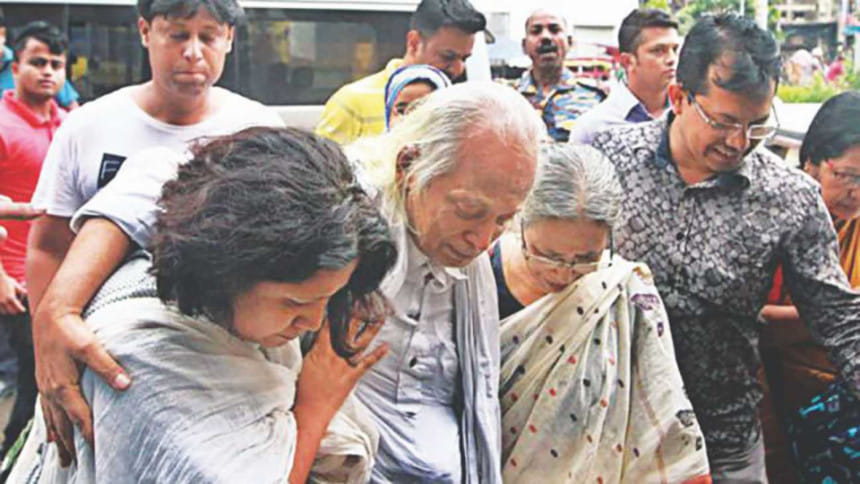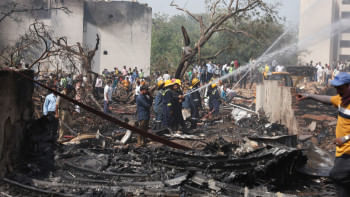Protection of enforced disappearance victims: Bangladesh needs legal reforms

Once again Bangladesh has come under the spotlight in international media, unfortunately not in a positive way. On July 6 2017, the Human Rights Watch report ("'We Don't Have Him': Secret Detentions and Enforced Disappearances in Bangladesh") published that at least 90 people were victims of enforced disappearance in 2016 alone with 48 disappearances reported in the first five months of 2017. The next day, Swedish newspaper Expressen published its report stating that since 2009, more than 400 dissidents have been killed in extrajudicial executions in Bangladesh and at least 384 people have disappeared, most of them being dissidents, activists or members of opposition parties.
Both the reports coincide with 'enforced-disappearance' (or abduction) of Farhad Mazhar, the prominent and controversial Bangladeshi writer and social activist. On July 3, 2017, Farhad Mazhar was abducted early morning from in front of his residence at Shyamoli, Dhaka. After a day of conflicting reports and rumours in the news as well as social media, Mazhar was rescued in Jessore by Bangladesh police in the evening while travelling alone on a Dhaka bound bus.
Mazhar's abduction can be used to illustrate the unanswered questions that are often associated with such 'disappearances' and the fact that we do not have proper laws in this country to deal with such situations. First of all, was Farhad Mazhar a victim of 'enforced disappearance' or a victim of 'abduction'? Moreover, some newspapers and online media initially termed him as 'missing'. Unfortunately, there is no such Bangladeshi law that clearly differentiates between 'abduction', 'missing' and 'enforced disappearance'. This is a major loophole in our laws. Therefore, we should make a new law which will determine the status of the victim according to the claim of the victim's family in the first instance and law enforcement agencies should consider this as prima facie evidence which can be changed according to further investigation.
Second, was the role of law enforcement agencies in accordance with the law? When finally Mazhar was rescued from a Dhaka bound bus it was not also clear whether he was offered any medical treatment or legal assistance from the advocate while he was in police custody in Khulna overnight. If not, then it is a clear violation of fundamental rights under Article 31 and Article 33 of our Constitution. Also, there seems to be discrepancies with 'due process of law'. Was he 'arrested' or 'detained' or 'rescued'? If he was rescued after abduction, why did Khulna police keep him in police custody instead of taking him to the hospital or bringing him back to Dhaka immediately? Can police keep a seventy plus year old person, traumatised and in need of immediate medical treatment, the whole night? Moreover, Didar Ahmed, the DIG of Khulna Range in a press conference after Farhad Mazhar's rescue, claimed that they believe the poet-columnist 'staged a drama' citing the circumstances. How did police come to such conclusion without conducting any investigation? Do our laws permit such media trial without the actual trial happening before the court? Moreover, the press conference next day by Dhaka Metropolitan Police in this regard is contradictory to DIG Didar Ahmed's first statement.
Third, what was the legal basis for Mazhar's interrogation in Detective Branch police office when he was brought back to Dhaka? DB interrogated him there for several hours and then took him to CMM Court for giving a statement under Section 164 of CrPC. It is not clear whether Mazhar was detained under Section 54 and interrogated under Section 167 of CrPC. Was there enough suspicious activity to warrant interrogation by DB? If interrogated under Section 167, did DB take the magistrate's permission before interrogation? Also, was Mazhar compelled to give statement at court under Section 164 or was it voluntary? If he was compelled to give a statement at court, was he a suspect of a crime? If so, then what was the ground of suspicion? Moreover, according to the verdict by Appellate Division of the Supreme Court of Bangladesh on the application of Section 54 and 167 last year, the total treatment by law enforcement agencies against Farhad Mazhar was not in accordance with law. Because, the judgment says: 1. Law enforcers must not arrest anyone under Section 54 to put him/her into detention, 2. The detainee shall be allowed to meet lawyers and relatives for legal assistance, 3. The detainee must be checked by a doctor before and after the interrogation. So, it seems that the law enforcement agencies treated Mazhar as a 'suspect' or 'accused' of a crime instead of treating him as a 'victim', which was not in accordance with the Supreme Court's Judgment on Section 54 and Section 167. Also, it was not clear why the CMM Court released him on his own custody after recording his statement under Section 164 and made him sign a Tk 10,000 bond. If CMM Court treated Mazhar as a victim, then why would he need any bond to get a release? The whole scenario remains unclear due to lack of further clarification from the government.
Therefore, it is high time for Bangladesh to legislate a proper 'Victim Support Act', and ratify the 'International Convention for the Protection of All Persons from Enforced Disappearance.' It should respect the 'UN Basic Principles on the Use of Force and Firearms by Law Enforcement Officials'. We hope that soon Bangladesh will bring these legal reforms along with other administrative and executive reforms to ensure and protect fundamental rights of the people.
Md Saimum Reza Talukder is an advocate in Judge Court, Dhaka and currently studying law and digital technologies at Leiden University.
E-mail: [email protected]

 For all latest news, follow The Daily Star's Google News channel.
For all latest news, follow The Daily Star's Google News channel. 







Comments